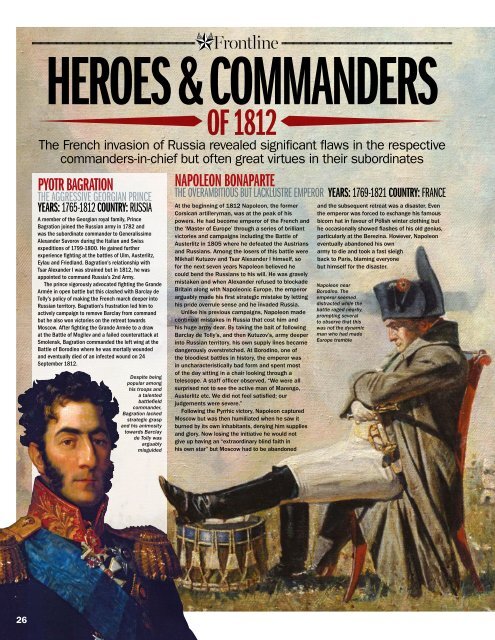Create successful ePaper yourself
Turn your PDF publications into a flip-book with our unique Google optimized e-Paper software.
Frontline<br />
HEROES & COMMANDERS<br />
The French invasion <strong>of</strong> Russia revealed significant flaws in the respective<br />
commanders-in-chief but <strong>of</strong>ten great virtues in their subordinates<br />
PYOTR BAGRATION<br />
THE AGGRESSIVE GEORGIAN PRINCE<br />
YEARS: 1765-1812 COUNTRY: RUSSIA<br />
A member <strong>of</strong> the Georgian royal family, Prince<br />
Bagration joined the Russian army in 1782 and<br />
was the subordinate commander to Generalissimo<br />
Alexander Suvorov during the Italian and Swiss<br />
expeditions <strong>of</strong> 1799-1800. He gained further<br />
experience fighting at the battles <strong>of</strong> Ulm, Austerlitz,<br />
Eylau and Friedland. Bagration’s relationship with<br />
Tsar Alexander I was strained but in 1812, he was<br />
appointed to command Russia’s 2nd Army.<br />
The prince vigorously advocated fighting the Grande<br />
Armée in open battle but this clashed with Barclay de<br />
Tolly’s policy <strong>of</strong> making the French march deeper into<br />
Russian territory. Bagration’s frustration led him to<br />
actively campaign to remove Barclay from command<br />
but he also won victories on the retreat towards<br />
Moscow. After fighting the Grande Armée to a draw<br />
at the Battle <strong>of</strong> Mogilev and a failed counterattack at<br />
Smolensk, Bagration commanded the left wing at the<br />
Battle <strong>of</strong> Borodino where he was mortally wounded<br />
and eventually died <strong>of</strong> an infected wound on 24<br />
September 1812.<br />
Despite being<br />
popular among<br />
his troops and<br />
a talented<br />
battlefield<br />
commander,<br />
Bagration lacked<br />
strategic grasp<br />
and his animosity<br />
towards Barclay<br />
de Tolly was<br />
arguably<br />
misguided<br />
OF 1812<br />
NAPOLEON BONAPARTE<br />
THE OVERAMBITIOUS BUT LACKLUSTRE EMPEROR YEARS: 1769-1821 COUNTRY: FRANCE<br />
At the beginning <strong>of</strong> 1812 Napoleon, the former<br />
Corsican artilleryman, was at the peak <strong>of</strong> his<br />
powers. He had become emperor <strong>of</strong> the French and<br />
the ‘Master <strong>of</strong> Europe’ through a series <strong>of</strong> brilliant<br />
victories and campaigns including the Battle <strong>of</strong><br />
Austerlitz in 1805 where he defeated the Austrians<br />
and Russians. Among the losers <strong>of</strong> this battle were<br />
Mikhail Kutuzov and Tsar Alexander I himself, so<br />
for the next seven years Napoleon believed he<br />
could bend the Russians to his will. He was gravely<br />
mistaken and when Alexander refused to blockade<br />
Britain along with Napoleonic Europe, the emperor<br />
arguably made his first strategic mistake by letting<br />
his pride overrule sense and he invaded Russia.<br />
Unlike his previous campaigns, Napoleon made<br />
continual mistakes in Russia that cost him and<br />
his huge army dear. By taking the bait <strong>of</strong> following<br />
Barclay de Tolly’s, and then Kutuzov’s, army deeper<br />
into Russian territory, his own supply lines became<br />
dangerously overstretched. At Borodino, one <strong>of</strong><br />
the bloodiest battles in history, the emperor was<br />
in uncharacteristically bad form and spent most<br />
<strong>of</strong> the day sitting in a chair looking through a<br />
telescope. A staff <strong>of</strong>ficer observed, “We were all<br />
surprised not to see the active man <strong>of</strong> Marengo,<br />
Austerlitz etc. We did not feel satisfied; our<br />
judgements were severe.”<br />
Following the Pyrrhic victory, Napoleon captured<br />
Moscow but was then humiliated when he saw it<br />
burned by its own inhabitants, denying him supplies<br />
and glory. Now losing the initiative he would not<br />
give up having an “extraordinary blind faith in<br />
his own star” but Moscow had to be abandoned<br />
and the subsequent retreat was a disaster. Even<br />
the emperor was forced to exchange his famous<br />
bicorn hat in favour <strong>of</strong> Polish winter clothing but<br />
he occasionally showed flashes <strong>of</strong> his old genius,<br />
particularly at the Berezina. However, Napoleon<br />
eventually abandoned his own<br />
army to die and took a fast sleigh<br />
back to Paris, blaming everyone<br />
but himself for the disaster.<br />
Napoleon near<br />
Borodino. The<br />
emperor seemed<br />
distracted while the<br />
battle raged nearby,<br />
prompting several<br />
to observe that this<br />
was not the dynamic<br />
man who had made<br />
Europe tremble<br />
26


















